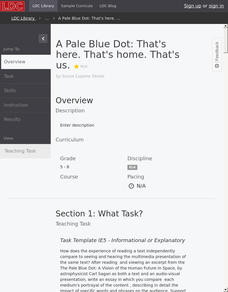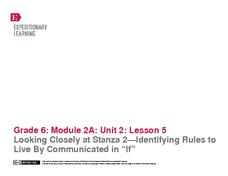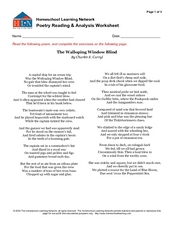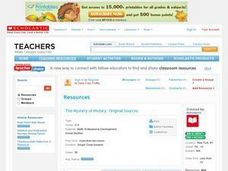Literacy Design Collaborative
A Pale Blue Dot: That's Here. That's Home. That's Us.
21st-century learners live in such a visual world that many are unused to letting their minds imagine the picture that words create. An excerpt from Carl Sagan's lecture, "The Pale Blue Dot: A Vision of the Human Future in Space,"...
National Endowment for the Humanities
“Every Day We Get More Illegal” by Juan Felipe Herrera
A study of Jan Felipe Herrera's poem "Every Day We Get More Illegal" opens the door for a discussion on immigration. To begin, class members examine the photograph "Desert Survival," record their observations of the image, and then...
University of California
Migration of Early Humans: Evidence and Interpretations
While much of prehistory is cloaked in mystery, ancient ancestors left evidence in DNA, languages, and materials from their time. Using photographs of items such as cave paintings and ancient tools, as well as maps of linguistic patterns...
Simon & Schuster
Curriculum Guide to: Pride and Prejudice by Jane Austen
An 18-page curriculum guide for Jane Austen's Pride and Prejudice consists of five lessons. The first plan asks readers to compare the manners, social behaviors, and class issues in Austen's novel to today's. Next, pupils examine a...
Simon & Schuster
Curriculum Guide to: Wuthering Heights by Emily Brontë
Eight lessons and worksheets comprise a curriculum guide for Emily Bronte's Wuthering Heights. Class members create a timeline that includes world-historical events as well as events in the novel. They analyze the speaking styles of...
Angel Island Immigration Station Foundation
Moving to the Poems of Angel Island
A poem carved on Angel Island's walls is the guiding text of a lesson that challenges scholars to put movement into a written piece of art. After warm up-activities, learners play a game of "Pass the Clap" and "Pass the Line," in which...
EngageNY
End of Unit 1 Assessment: Fishbowl Discussion, Part 2: Comparing Conflicting Accounts of the Pearl Harbor Attack
Partner up! Scholars continue their fishbowl activity with one partner sitting inside the circle and one sitting outside the circle. Participants add to sentence starters to analyze the perspective of the Pearl Harbor Attack seen in the...
EngageNY
End of Unit Assessment: Fishbowl Discussion, Part 1: Comparing Conflicting Accounts of the Pearl Harbor Attack
Scholars continue discussing Unbroken by using a fishbowl activity. Some readers share thoughts about the Day of Infamy, while others sit and observe the conversation. After the activity, pupils share what they learned.
EngageNY
Connecting Ideas in Primary and Secondary Sources: What Led to the Attack on Pearl Harbor?
Let's make some sense of those thoughts! Scholars continue thinking about the different perspectives on Pearl Harbor. They analyze quotes from War in the Pacific, Day of Infamy, and Fourteen-Part Message. Readers tape each quote to chart...
College Board
Calculations Aren't Enough!
Unlike mathematics, statistics comes with a context. The author reminds teachers that data analysis involves using the context to make sense of the numbers. The article stresses good communication skills by highlighting the scoring...
CCSS Math Activities
Smarter Balanced Sample Items: High School Math – Claim 2
Problem solve across the content standards. The presentation slides provide 19 sample items from the Smarter Balanced high school assessment. Items illustrate Claim 2, problem solving, of the test and are drawn from all the high school...
Georgetown University
Cup-Activity: Writing Equations From Data
Determine how cup stacking relates to linear equations. Pupils stack cups and record the heights. Using the data collected, learners develop a linear equation that models the height. The scholars then interpret the slope and the...
Florida Alliance for Arts Education
Theatre Arts
What skills do storytellers employ to bring to life the characters and events in their tales? After listening to a recording of a Haitian folk tale, class members consider how tone of voice, pace, and gestures can be used to enliven a...
CK-12 Foundation
Determining the Equation of a Line: Trip Functions
Let the function drive the activity. The interactive displays the odometer on a car for a trip. Pupils determine and interpret the slope of the situation. Then, they find a verbal description of the equation of the function.
Illustrative Mathematics
Temperature Conversions
Complete two conversions at once using compositions. Pupils use the conversion formulas for temperatures to calculate a formula to convert directly between Kelvin and Fahrenheit. Classmates determine the meanings of composition notation...
EngageNY
Looking Closely at Stanza 2—Identifying Rules to Live By Communicated in “If”
Pupils take part in a close reading of the poem, If by Rudyard Kipling, in which they delve deep into its meaning and identify its rules to live by. As the grand discussion progresses, learners then relate the poem's rules with those...
Winterhill School
Poetry Analysis
Gain greater insight into poems using a poetry analysis learning exercise. Here, scholars follow steps and answer questions to dissect any poem. Topics include the poem's meaning, theme, technique, and structure, as well as personal...
August House
The Hidden Feast
What is a proverb? This is the leading question of this resource. First, explore proverbs and their meanings. Then, read aloud The Hidden Feast: A Folktale from the American South by Martha Hamilton and Mitch Weiss and partake in a grand...
August House
Go to Sleep, Gecko
Use this multidisciplinary lesson to delve into these subjects: English language arts, math, science, drama, and character education. After reading, discussing, and making interpretations about Go To Sleep, Gecko!: A Balinese Folktale by...
Illustrative Mathematics
Who Has the Best Job?
Making money is important to teenagers. It is up to your apprentices to determine how much two wage earners make with their after school jobs. Participants work with a table, an equation, and a graph and compare the two workers to see...
Curated OER
Poetry Reading: Analysis Worksheet
Explore poetry by reading the poem "The Walloping Window Blind" by Charles E. Carryl, and completing an analysis with your class. The worksheet provides the entire poem, a graphic organizer to help with summarizing and paraphrasing, and...
Curated OER
"A Boy and a Man" from Banner in the Sky by James Ramsey Ullman
A great resource for chapter 2 of Banner in the Sky by James Ramsey Ullman, this worksheet asks learners to respond to a series of lower- and higher-level questions using complete sentences following a class discussion. Pupils are asked...
Curated OER
The Mystery of History-Original Sources
Students research the events surrounding the Alamo in 1863, and explore the differences between primary and secondary sources of information. They brainstorm lists of items used to research a subject and categorize them as primary or...
Curated OER
Hermeneutics: Teaching Students Author's Purpose
Your developing literary critics discuss 'perspective' and discuss how the same occurence can be interpreted by two different people in two different ways. They read Ryszard Kapuscinski's untitled poem, infer meaning of the poem, and...

























